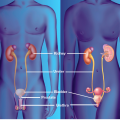Saliva is a clear liquid made by several glands in your mouth area. Saliva is an important part of a healthy body. It is mostly made of water. But saliva also contains important substances that your body needs to digest food and keep your teeth strong.
Saliva is important because it:
- Keeps your mouth moist and comfortable
- Helps you chew, taste, and swallow
- Fights germs in your mouth and prevents bad breath
- Has proteins and minerals that protect tooth enamel and prevent tooth decay and gum disease
- Helps keep dentures securely in place
You make saliva when you chew. The harder you chew, the more saliva you make. Sucking on a hard candy or cough drop helps you make saliva, too.
What is a urinary tract infection (UTI)?
Urinary tract infections (UTIs) are common infections that happen when bacteria, often from the skin or rectum, enter the urethra and infect the urinary tract. The infections can affect several parts of the urinary tract, but the most common type is a bladder infection (cystitis).
Some people are at higher risk of getting a UTI. UTIs are more common in women because their urethras are shorter and closer to the rectum. This makes it easier for bacteria to enter the urinary tract. Around one in two women and one in 20 men will get a UTI in their lifetime.
Symptoms of UTI may include:
- A strong, persistent urge to urinate
- A burning sensation when urinating
- Passing frequent, small amounts of urine
- Cloudy or strong-smelling urine
- Pain or pressure in the lower abdomen or back
- Fatigue or fever (in more severe cases)
What Causes UTI?
The most common cause of UTI is the invasion of the urinary tract by bacteria. The bacteria can come from the bowel or skin around the anus and genitals and can enter the urinary tract through the urethra. The most common bacterium responsible for UTI is Escherichia coli (E. coli), which is a normal inhabitant of the gut.
Other factors that can increase the risk of developing a UTI include:
- Being female (women have a shorter urethra than men, which makes it easier for bacteria to reach the bladder)
- Sexual activity (sexual intercourse can introduce bacteria into the urethra)
- Use of certain types of contraceptives (such as diaphragms or spermicides)
- Menopause (lower levels of estrogen can make the urinary tract more vulnerable to infection)
- Diabetes or other medical conditions that suppress the immune system
- Having a urinary catheter in place
- Urinary tract abnormalities (such as a blockage or obstruction)
- Poor hygiene practices (such as not wiping from front to back after bowel movements)
Can Saliva Cause Urinary Tract Infection (UTI)?
Yes, but not directly. While saliva itself does not directly cause UTI, it can contain bacteria that can lead to infection indirectly. Here are some scenarios in which saliva may contribute to UTI:
- Oral sex
During oral sex, there is direct contact between the mouth and the genitals, which can result in the transfer of bacteria from the mouth to the urinary tract. If the bacteria in the saliva are pathogenic (able to cause disease), they can cause infection in the urinary tract. In some cases, oral sex can also cause irritation or injury to the urethra, which can make it easier for bacteria to enter the urinary tract.
One study published in the Journal of Urology found that women who had oral sex with their male partners were more likely to develop UTI than those who did not. The researchers suggested that the transfer of bacteria from the mouth to the urethra during oral sex may be a contributing factor.
There are a few things you can do to prevent this from happening, these include urinating after sex to help to flush bacteria out of the urethra, thereby helping to prevent a urinary tract infection (UTI). It may be especially helpful for women, or people who are prone to UTIs. However, peeing after sex will not prevent pregnancy or sexually transmitted infections (STIs).
Avoid holding in your urine, as this can encourage bacterial growth. Try not to wait more than 3 to 4 hours to pee, and completely empty your bladder each time. This is even more important if you’re pregnant as pregnancy puts you at an increased risk for a UTI. Holding your pee can further increase the risk.
- Sharing of personal items
Sharing personal items such as toothbrushes, drinking glasses, or utensils can also increase the risk of UTI. If one person has a bacterial infection in their mouth or throat, the bacteria can be transferred to the item and then to another person. If the second person then touches their genitals or urinary tract with contaminated hands or uses the contaminated item to clean themselves, they can develop a UTI.
- Poor oral hygiene
Poor oral hygiene can lead to the growth of pathogenic bacteria in the mouth, which can then be transferred to the urinary tract through oral sex or sharing of personal items. Regular brushing, flossing, and using mouthwash can help reduce the number of bacteria in the mouth and decrease the risk of UTI.
- Immune system suppression
In some cases, people with compromised immune systems may be more susceptible to UTI caused by bacteria from saliva. This can occur in people with conditions such as HIV/AIDS, cancer, or autoimmune disorders. Saliva may also contain other pathogens, such as viruses or fungi, which can lead to UTI in people with weakened immune systems.
Prevention of UTI
To prevent UTI, it is important to practice good hygiene habits and maintain a healthy urinary tract. Here are some tips to reduce the risk of developing a UTI:
- Drink plenty of water to help flush bacteria out of the urinary tract
- Wipe from front to back after bowel movements to avoid transferring bacteria from the anus to the urethra
- Urinate after sex to help flush bacteria out of the urinary tract
- Avoid using harsh soaps, bubble baths, or feminine hygiene sprays that can irritate the urinary tract
- Use condoms during sexual activity to reduce the risk of infection
- Avoid using spermicides or diaphragms if they have been associated with UTI in the past
- Practice good oral hygiene to reduce the number of bacteria in the mouth
Treatment of UTI
If you suspect you have a UTI, it is important to seek medical attention promptly. UTIs can lead to more serious complications if left untreated, such as kidney damage or sepsis. Treatment for UTI usually involves a course of antibiotics to kill the bacteria causing the infection. In some cases, over-the-counter pain relievers such as ibuprofen may also be recommended to help manage discomfort.
In conclusion, while saliva itself does not cause UTI, it can indirectly contribute to infection through the transfer of bacteria during oral sex, sharing of personal items, or poor oral hygiene. It is important to practice good hygiene habits and seek medical attention promptly if you suspect you have a UTI.






